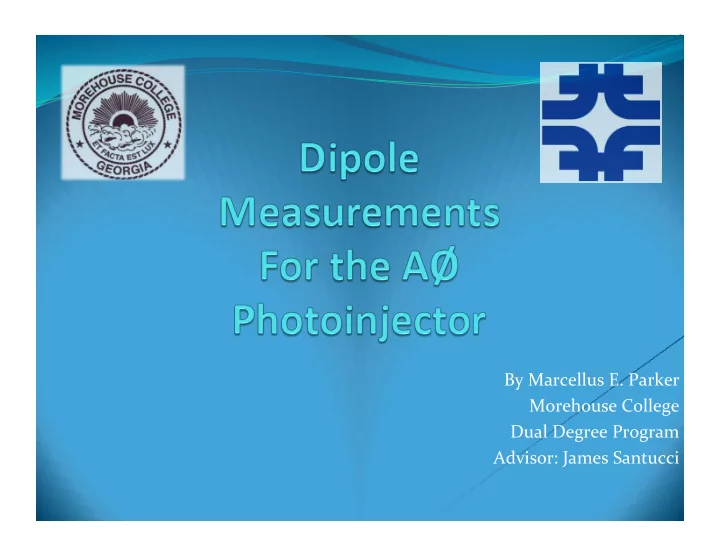

By Marcellus E. Parker Morehouse College Dual Degree Program Advisor: James Santucci
Outline AØ Photoinjector (Background) Function of dipole magnets About dogleg set‐up “Get to the point what was your project about!! ” (Purpose) Learning the tricks of the trade (Small dipole measurements) Plots From dipole magnets Summary
A0 Photoinjector (Background) Originally For the TeV Superconducting Linear Accelerator (TESLA) project, A Ø served as the Test Facility for the project known as the TESLA Test Facility (TTF) now know as A Ø PI The A Ø Photoinjector (A Ø PI) is a linear accelerator that accelerates electrons up to 16 MeV Uses a photocathode to produce electrons Ultimate goal is accelerator research and development The A Ø PI now serves as a user facility for graduate and post graduate students. Currently used for emittance exchange experiments
Func9on Of Dipole Magnets 4 dipole magnets are used in the photoinjector for dispersion and compression purposes Each bend beam at 22.5° Each of the dipoles operate @ 1.8A, 18 layers of coils wrapped longitudinally around steel 87 times this comes out to 1,566 turns According to Ampere’s Law
About Dog Leg Set‐up Beam gets compressed after traveling through the dipole field green boxes indicate area of measured field (28” x 10”) Lorentz Force Equation
C‐Framed Magnets
“Get to the point what was your project about!! ” (Purpose) Undesired interaction between the magnetic fringe fields of the 1 st and 2 nd dipole magnets in the photoinjector The dipoles are C‐framed magnets This design can produce excess magnetic field (fringe field) Fringe fields need to be measured to help understand the problematic interaction between dipoles 1 and 2 This is where I come in!!
TDA Dipole Magnets 1 and 2 Dipole 2 Dipole 1
Learning the tricks of the trade (Small dipole measurements) Small scale measurements on corrector magnets Rewired quadrupole magnets to have a dipole field Fabricated a mini magnet test stand to conduct my own measurements Studied flux line behavior
About the Hall Probe
Plots From Dipole Small Measurements Summation Left Pole Magnetic Flux Density vs Pos. 2.5‐3 2‐2.5 3 3 2 1.5‐2 1 2.5 0.045 0.025 0 1‐1.5 0.005 2 0.5‐1 Tesla 1.5 0‐0.5 Right Pole 1 0.055 0.5 3 0.045 0.035 2 X‐axis[inches] 0.025 0 1 0.015 0.035 0 0.005 0.005 0.005 0.015 0.025 0.035 0.045 0.055 Z‐axis[inches]
The Pre Game Prepara9ons (Measurements) Measurements of large dipoles were performed at the Magnet Test Facility ( MTF) Measured half inch increments over a 52” X 20” area Performed two sets of measurements Each set was done twice, at 1.8A and 4.5A 1 st set= 1 energized magnet @1.8A + repeat @4.5A Hall Probe 2 nd set= 2 energized magnet @1.8A repeat @4.5A
…con9nued Dipoles had to be aligned EXACTLY in the same way they are aligned in beam line Goal of measurements is to create the same magnetic field produced in the beam line
52” ‐5” 5” Dipole 2 ‐26” 26” Dipole 1 NOT TO SCALE
RESULTS
Dipole 1 Powered @1.8A B [T] Z axis {inches] X axis [inches]
Dipole 1 & 2 Powered @1.8A B [T] Z axis {inches] X axis [inches]
DIFFERENCE PLOT B [T] Z axis X axis {inches] [inches]
Summary Measurements performed confirm that fringe field interactions between dipoles 1 and 2 exists Possible solution: Utilize magnetic shielding Invest in Box frame magnets
I’d Like to thank SIST Staff and Committee Including; Dr. Davenport, Dianne Engram, Elmie Peoples, Dave Peterson,, AØ Group MTF Group Accelerator Division physicists Including; Helen Edwards, Mike Church, Mike Syphers, Randy Thurmen‐Keup, Michael Cooke, Amber Johson, Arden Warner, Chandra Bhat
Extra slides
THE GREAT WAIT Crash Course in OTR (Optical transition radiation) Worked At Pelletron Beam Optics 101 Hills equation Thick lenses and Thin lenses Took advantage off The great tours that were available!
Op9cle Transii9on Radia9on AT Pelletron OTR test were conducted to determine if thermal cathode needed to be replaced. An aluminum film placed at 45° reflects radiation in the visible spectrum (LIGHT) OTR shows light intensity and spatial information Used also in Photoinjector to determine position of Beam
OTR PHOTOS 35KeV 20KeV
@ 20kV light intensity v.s Voltage 1600000 1489123 1400000 1328107 1200000 1.9A_20kV_Pulse Scan 1000000 892252 2.0A_20kV_Pulse Scan 817551 800000 734535 726385 600000 2.1A_20kV_Pulse Scan 541446 436413 400000 377709 373933 321068 2.2A_20 kV_Pulse Scan 216344 200000 190479 188117 159360 124470 114274 101759 92856 85166 69748 63495 57605 60013 54515 14284 2636 0 ‐3500 ‐3000 ‐2500 ‐2000 ‐1500 ‐1000 ‐500 0
Equa9on behind It all Model Beam position after thick lens Assume that only a dipole fields exists Neglect energy loss from cyclotron radiation x 0 x R R R R R R 11 12 13 14 15 16 ' x 0 x ' R 21 R 22 R 23 R 24 R 25 R 26 y ' 0 y R 31 R 32 R 33 R 34 R 35 R 36 = y ' 0 y ' R 41 R 42 R 43 R 44 R 45 R 46 z ' 0 z ' R 51 R 52 R 53 R 54 R 55 R 56 Δ p Δ p R 61 R 62 R 63 R 64 R 65 R 66 p p
Recommend
More recommend